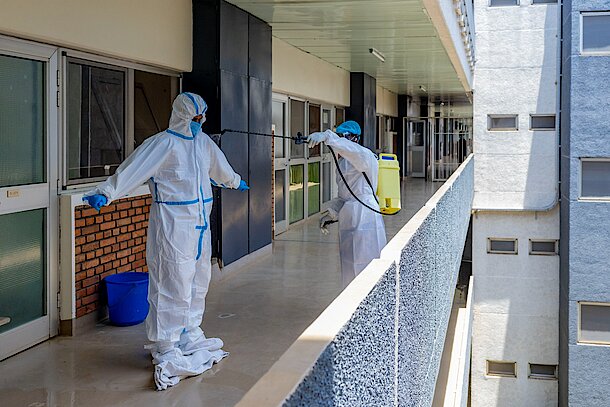
Kigali: It has been two weeks since Rwanda’s Ministry of Health confirmed an outbreak of the Marburg Virus disease in several health facilities. In response, the Government of Rwanda swiftly launched initiatives to contain the spread of this deadly hemorrhagic fever. Among these initiatives is the establishment of a National Response Workforce, a multisectoral team tasked with executing strategic objectives to manage and control the outbreak, minimizing transmissions and fatalities while protecting the health and dignity of communities across Rwanda.
Through its National Response Force, Rwanda is committed to reducing deaths and cases associated with the Marburg virus and preventing its spread from known clusters in Kigali hospitals. This dedicated team aims to contain the virus, ensuring the health and safety of the entire population.
Rwanda’s Ministry of Health has set specific goals to address the outbreak, including identifying all cases and tracing contacts to prevent further transmission. The Ministry is enhancing its rapid response capacity and working to limit community and hospital transmission risks. Effective practices are promoted through risk communication, social mobilization, and community engagement.
Additionally, the Ministry is strengthening the diagnostic capabilities of national and local laboratories. It ensures that patients, survivors, and frontline workers receive both clinical and psychosocial care. Rwanda is collaborating closely with neighboring countries to enhance their ability to identify and respond to potential cases, including exit screening at key locations to prevent cross-border transmission.
During a visit to Rwanda on October 8, 2024, the Director General of the Africa CDC, Dr. Jean Kaseya, commended the country’s rapid and effective response to the Marburg outbreak. He appreciated Rwanda’s efforts to contain the virus after touring the Marburg Command Post and meeting with Rwanda’s Health Minister Dr. Sabin Nsanzimana. Dr. Kaseya stated, “Impressed by Rwanda’s swift, proactive response. Africa CDC stands firmly with Rwanda, committed to safeguarding lives and stopping the spread.”
Currently, the response team is engaged in decontaminating infected areas, providing treatment to patients in designated centers, and addressing public concerns through the RBC’s emergency number 114. Psychological experts offer counseling and psychosocial support to survivors and their families, aiding in rapid reintegration and combating stigma.
On October 7, 2024, Rwanda began vaccinating frontline health workers and high-risk populations to protect them from the Marburg Virus and ensure their readiness to respond effectively. The National Response Workforce is organized into clusters, including communication, diagnostics, surveillance, evacuation, procurement, case management, strategic information, psychology, resource mobilization, operations, a call center, mobile vaccination clinics, and treatment facilities.
The Marburg Virus is a serious and often fatal disease transmitted through contact with the bodily fluids of infected individuals or contaminated surfaces. Initial symptoms resemble those of malaria and other hemorrhagic fevers, including high fever, severe headaches, muscle pain, fatigue, vomiting, and diarrhea. The Ministry of Health encourages the public to take preventive actions, such as avoiding contact with symptomatic individuals, staying away from crowded areas, refraining from handling the deceased, practicing good hygiene by frequently washing hands and wearing safety gear when caring for patients is also essential.
In conclusion, Rwanda’s proactive measures in response to the Marburg Virus outbreak demonstrate the country’s commitment to public health and safety. By prioritizing rapid response, community engagement, and effective vaccination strategies, Rwanda aims to protect its citizens and prevent further transmission. The collaborative efforts of health authorities, international partners, and local communities are crucial in overcoming this challenge and ensuring a safer future for all. (End)
